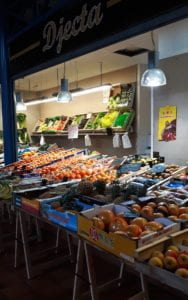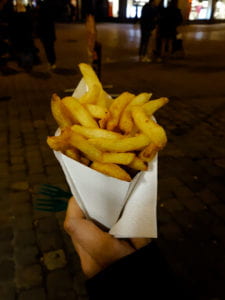Friday, January 31, 2020 | Written by Blanca
Being at GTL for the semester makes for an incredibly auspicious location from which you can conveniently traverse much of the entire continent of Europe (a perk of which I have taken advantage multiple times already). But, while it would bring me no greater joy than to inundate everyone with my tales recounting weekends gallivanting cobblestone streets and misty mornings among Flemish architecture, each façade with more character than the last, I think that the most insightful portrayals of European life actually emerge from the little details. Sure, I’d anticipated that studying, eating, and traveling might be entirely different experiences in places with so much culture and history (and they are!), but nobody informed me about more mundane aspects of life, like that grocery stores here stock milk in six-packs and that a lactose intolerant person like myself can simply puncture the six-pack and remove a single bottle instead of having to buy an entire six-liter package of milk. (On a side note, scenarios like this one are ones in which it becomes especially useful to employ a hawkish eye in observing the local residents and their grocery store behaviors.)
Experiencing the nuances of life in a new place are, dare I say it, perhaps even more fascinating than sightseeing, picture-taking, and general tourist-ing. While I’ll still be doing plenty of the latter, I thought I’d share some of the quirks and unique details I’ve noticed about being abroad as well. Behold! Europe: Through the Looking Glass*.
(*actually through my glasses, which always seem to be smudged and are, at this point, a years-old, outdated prescription because my favorite frames seem to be perpetually out of stock—but rest assured that this takes away nothing from the Authentic European Experience™)
- Everything in France seems to be smaller: chairs, elevators, cars—and by extension, the width of roadway lanes. Public transportation (i.e. busses) are also widespread, and for the bus lines that don’t drive along designated bus lanes, I’ve been left to marvel at how their drivers are able to maneuver the large, cumbersome busses through such narrow and meandering roads.
- While there are definitely still traffic lights scattered at intersections, European cities increasingly employ roundabouts/traffic circles instead of traditional four-way junctions. Perhaps they’re on to something: studies have shown that roundabouts significantly reduce injury crashes at intersections.
- On the topic of transportation, it seems that the vast majority of cars driven in Europe are hatchbacks. I haven’t the slightest idea why this is so.

The fruit stalls at Marche Couvert in Downtown Metz - Fresh produce in even the most generic of European supermarkets is, put quite plainly, on another level. The carrots? Simply sublime. And, despite avoiding grape tomatoes like the plague in America because they always seem to be so watery (and not much else), I’m pleasantly surprised to announce that I’ve yet to encounter a European grape tomato that I didn’t like.
- Many restrooms, commonly referred to as water closets, in public spaces require a payment to use, usually a Euro or less. Beware of those which ask for a specific amount of change, like €0.50, though. If you instead insert a €1 coin, assuming that you’re essentially paying double for entry, prepare to be left bewildered when the coin collection slot simply eats up your Euro and then defiantly refuses to budge.

A classic cone of frites from a Belgium friterie—a must-try - Many Europeans are multilingual, especially those that live in areas where there are a multitude of languages spoken, and even more so, I’ve noticed, if they are young. Maybe this is out of necessity, but as someone who speaks, reads, and writes only English fluently, I am equal parts impressed, grateful, and feeling slightly under-accomplished. Perhaps it’s time to brush up on my Duolingo lessons after all.
- The best ‘French’ fries I’ve had since arriving have been in Belgium. Go figure.
